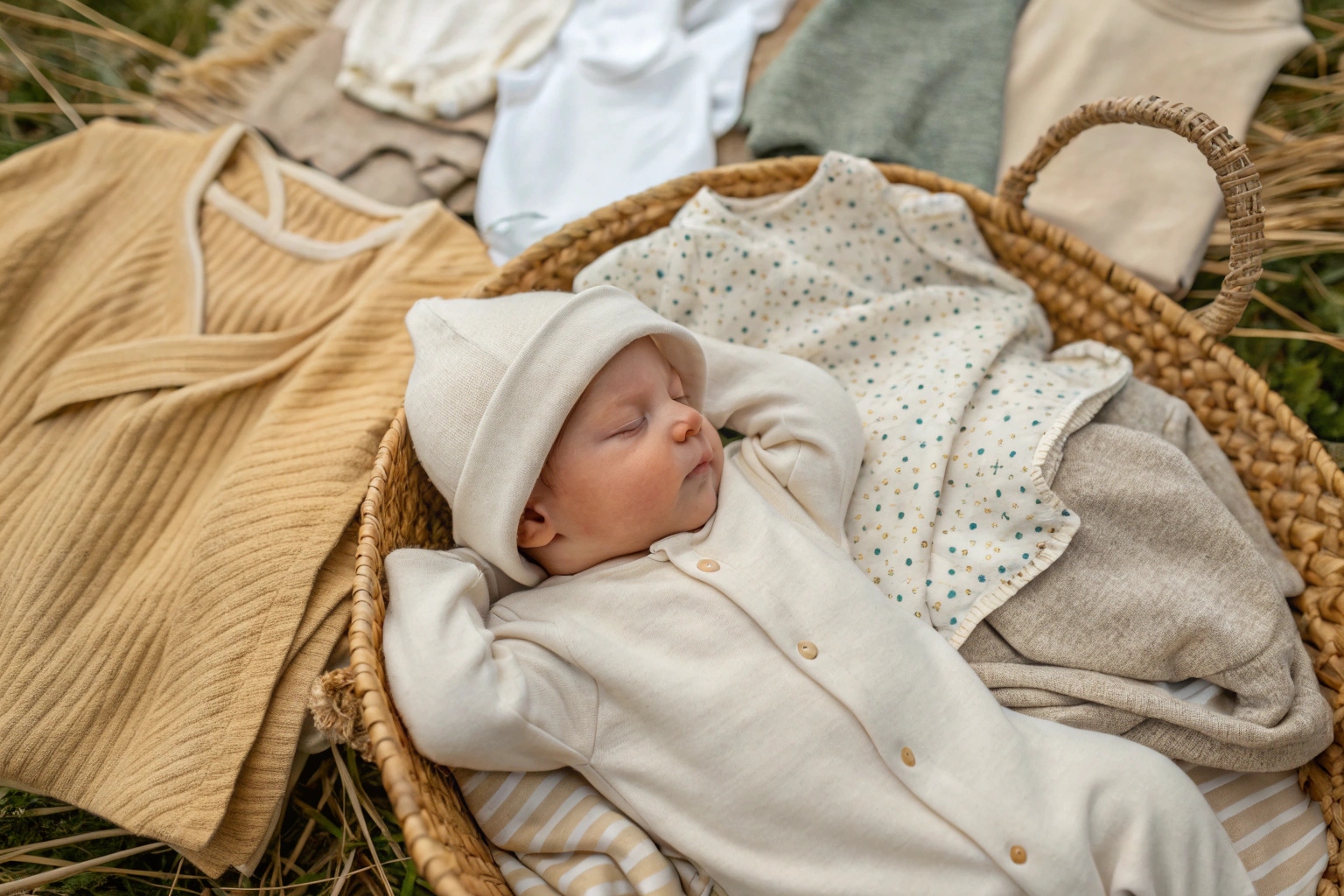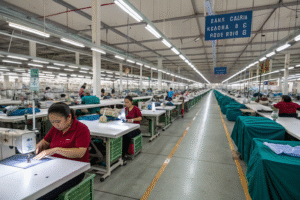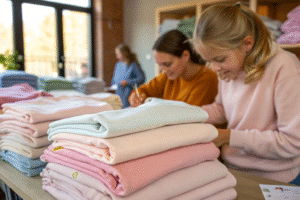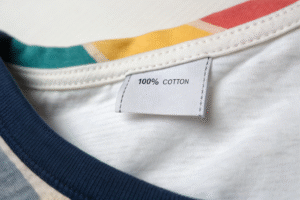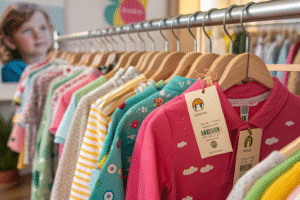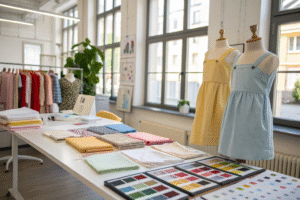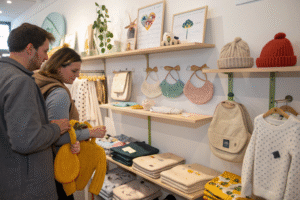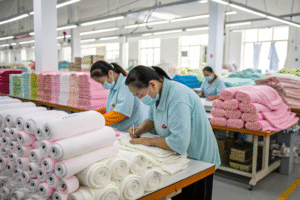Soft. Natural. Safe. That’s how people describe organic clothing. But does it really make a difference to your health?
Yes, organic clothing is generally a healthier option—especially for babies, kids, and people with sensitive skin—because it avoids harsh chemicals and prioritizes gentle, breathable materials.
Let’s take a closer look at why organic clothing has become a trusted choice for health-conscious parents and consumers—and whether it lives up to the promise.
How Organic Fabrics Reduce Skin Irritation and Allergies?
Skin is the body’s largest organ—and in babies, it’s also the most sensitive. What touches it matters.
Organic fabrics are less likely to cause skin irritation because they’re grown and processed without synthetic pesticides, dyes, or chemical softeners that can trigger allergies.
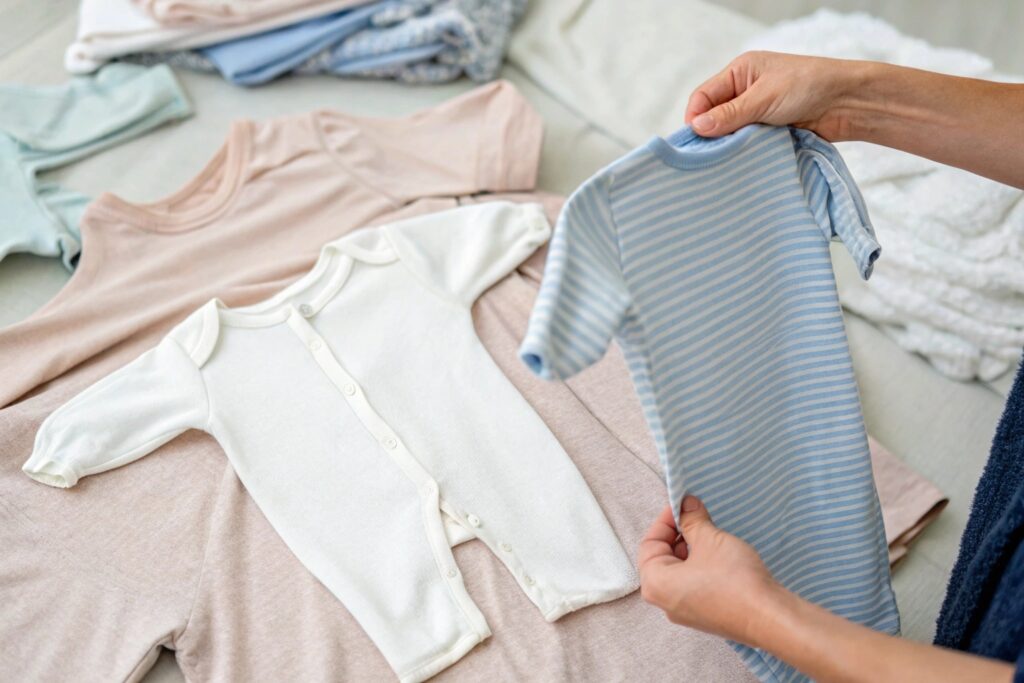
Why are natural fibers like organic cotton better for sensitive or eczema-prone skin?
Conventional clothing often carries residue from fertilizers, insecticides, or chemical dyes. These can cling to the fabric, especially if not properly washed out. When they come into contact with the skin, they may cause itching, redness, or rashes.
Organic cotton, by contrast, is cultivated without toxic treatments. It’s also usually processed using low-impact dyes and plant-based softeners. That reduces the number of possible irritants.
Some parents even report that switching to organic cotton for bodysuits and pajamas led to noticeable improvements in their child’s skin condition within days.
Here’s a quick comparison:
| Fabric Type | Irritation Risk | Why |
|---|---|---|
| Conventional Cotton | Medium–High | Often retains chemical residue |
| Organic Cotton | Low | Grown/processed without toxins |
| Polyester Blends | High | Traps sweat, uses harsh dyes |
| Bamboo Viscose | Medium | Soft, but may be chemically processed |
Can adults benefit from organic fabrics the same way children do?
Yes. Adults with allergies, eczema, or chemical sensitivity often notice fewer reactions with organic clothing. Even without visible skin problems, many people report better comfort, less itching, and improved breathability when wearing natural, untreated fibers.
What Chemicals Are Avoided in Organic Clothing Production?
Behind every conventional T-shirt is a long chemical trail. Organic production cuts many of these out.
Organic clothing avoids pesticides, formaldehyde, azo dyes, flame retardants, and other chemicals commonly used in conventional garment production.

What toxic substances are commonly found in regular clothing—but banned in organic production?
Here’s a breakdown of common chemicals found in conventional apparel and why they’re avoided:
| Chemical Name | Common Use | Health Risk |
|---|---|---|
| Formaldehyde | Wrinkle resistance | Respiratory irritation, carcinogen |
| Azo dyes | Colorant | Linked to cancer and allergies |
| PFCs (e.g. Teflon) | Water/stain resistance | Hormone disruption, toxic buildup |
| Heavy metals (lead) | Dye setting | Developmental harm in children |
| Chlorine bleach | Whitening | Skin irritation, respiratory issues |
| Flame retardants | Safety in sleepwear | Endocrine disruption, long-term harm |
Organic manufacturers avoid these from seed to shelf. GOTS (Global Organic Textile Standard), for example, bans the use of these chemicals in its certified garments.
How can buyers confirm that their “organic” clothing truly avoids these harmful additives?
Look for third-party certification. Claims like “all-natural” or “eco-friendly” are often unregulated. But logos like GOTS or OEKO-TEX® indicate real testing.
Also, request documentation from suppliers. A reliable babywear manufacturer should be able to provide chemical-free process details and lab results if needed.
Why Parents Prefer Organic Clothing for Babies and Kids?
Babies grow fast—but every stage is sensitive. Parents want peace of mind when choosing what touches their child’s skin.
Parents prefer organic clothing for kids because it’s softer, safer, and better aligned with their values. It reduces risk of rashes, supports sustainable farming, and feels more trustworthy.

What emotional and practical reasons drive parents toward organic babywear?
- Health confidence: Organic labels provide assurance against harsh chemicals.
- Softness: Organic cotton is typically less processed, retaining more of its natural softness.
- Ethical alignment: Many parents want to support farming and production practices that respect nature and people.
- Gifting preference: Organic clothing is perceived as premium—making it a popular baby shower or birthday gift.
Here’s a comparison of what new parents often tell us:
| Concern | Traditional Clothing | Organic Clothing |
|---|---|---|
| Skin sensitivity | May trigger rashes | Reduces irritation |
| Transparency | Vague process labels | Clear certifications |
| Gift value | Seen as standard | Seen as thoughtful/special |
| Price perception | Cheaper upfront | Better long-term comfort |
Do organic clothes really hold up as well as regular kidswear?
Yes—when made properly. In fact, many parents say they wash better over time. Because organic cotton is less chemically processed, its fibers often stay intact longer. Just follow care instructions: wash cold, avoid harsh detergents, and air dry when possible.
Are Certified Organic Labels Worth the Investment?
Organic babywear usually costs more. So is it truly worth the extra dollars?
Yes, certified organic labels are worth the investment for families who prioritize health, ethical sourcing, and long-term fabric durability. The premium pays off in peace of mind.

How do certifications like GOTS and OEKO-TEX® protect buyers and build trust?
Certified labels ensure that products meet strict criteria for both raw material and processing. That means:
- No GMOs or synthetic fertilizers in cotton farming
- No banned chemicals in dyeing or finishing
- Fair labor practices in production
- Traceability from farm to final product
These are audited by third-party bodies—not just brand promises.
Here’s a side-by-side of major certifications:
| Label | What It Certifies | Common in Babywear? |
|---|---|---|
| GOTS | Organic status + ethical processing | Yes |
| OEKO-TEX® | Free from harmful substances | Yes |
| USDA Organic | Farming method only | Less common |
| WRAP | Factory labor standards | Sometimes combined |
How should buyers and retailers justify higher costs to consumers?
It’s about value—not just price. Organic babywear offers visible softness and invisible safety. Retailers can highlight key points like “non-toxic dyes,” “gentle on baby skin,” and “ethically made.” Parents are willing to pay more when they understand the difference.
Offering certified organic options alongside standard lines also gives buyers choice—and educates them without pressure.
Conclusion
Organic clothing is more than a label. It offers comfort, safety, and peace of mind—especially for babies and those with sensitive skin. With certified practices and clean materials, it’s a healthy step worth taking.

